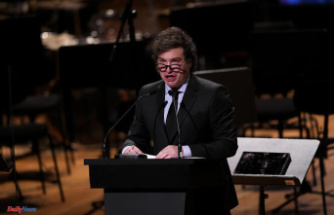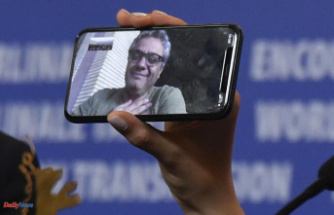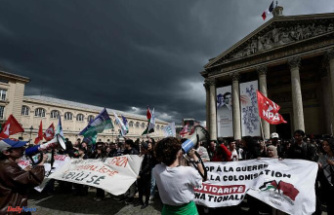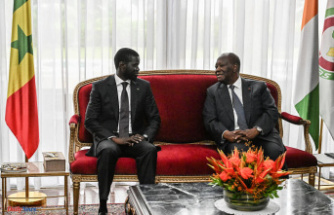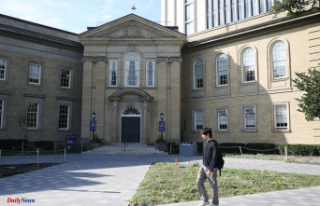In Dakar, Wednesday January 17, General Brice Oligui Nguema was greeted as soon as he got off the plane, by a jubilant crowd wearing t-shirts bearing his image. All smiles, in an elegant blue suit, the Gabonese head of state got caught up in the game of shaking hands and taking photos. “My success depends on Dakar,” he asserted during a meeting lasting more than five hours with the Gabonese diaspora, whom he wanted to reassure of his intentions to end the transition. Rebelote during an interview with his Senegalese counterpart, Macky Sall, whom the former defense attaché at the Gabonese embassy in Dakar flattered. “Senegal, for me, has always been this example of democracy […] to which we all aspire,” declared the putschist, a little over a month before the Senegalese presidential election.
This trip to Dakar is part of a desire to establish relations with the presidencies of the continent, while the Gabonese soldier seems tempted to join the club of heads of state elected at the end of a transition – the end of which is scheduled for August 2025. Still excluded from the African Union (AU) and the Economic Community of Central African States (ECCAS) since the coup d'état of August 30, 2023, Brice Oligui Nguema still has a way to go TO DO. At home, however, his balancing act between the former supporters of Ali Bongo Ondimba, the president he overthrew, and the former opposition, which he easily rallied to his cause after the putsch, allowed him to be widely dubbed by the political class.
On January 17, the appointment as deputy prime minister of Alexandre Barro Chambrier, who was one of Ali Bongo Ondimba's main opponents, further weakened the competition that Brice Oligui Nguema should have faced. The main opposition figures are now all in government. Three other members of the Alternance 2023 opposition platform, François Ndong Obiang, Paulette Missambo and Raymond Ndong Sima, respectively occupy the positions of first vice-president of the National Assembly, president of the Senate and prime minister. They will all have their way blocked by the transition charter, which indicates that they “are not eligible for the presidential election which will be organized to mark the end of the transition”. But this same charter remains silent regarding the fate reserved for Brice Oligui Nguema.
If the president of Alternance 2023, François Ndong Obiang, says he wants to discuss this unequal treatment during the national consultation planned for March, in reality the configuration of the current government responds to the plan established between the former opposition and the leader of the transition . To convince them of his democratic good faith, the general had promised them positions in the highest positions of the State during secret meetings at the home of Alexandre Barro Chambrier, in Akanda, in the weeks following the coup. State.
A weakened CEO
On the other hand, the former commander of the Republican Guard, who swore “fidelity to the president” before proceeding with his dismissal, did not turn his back on the former power. “There will be no witch hunt,” the junta promised two days after the putsch, limiting itself to arresting the “young team” led by Noureddin Bongo, the son of Ali Bongo Ondimba, considered by some to be his dauphin, suspected of large-scale corruption. In fact, in the general's inner circle, there are many former collaborators of the Bongo, starting with his right arm, Victorine Tchicot, former private secretary of Omar Bongo and special advisor to Ali Bongo Ondimba, or the secretary general of the presidency, Guy Rossatanga-Rignault, who entered the Palais du Bord de mer in 2009.
This strategy contributed to weakening the Gabonese Democratic Party (PDG). Many activists, convinced by Brice Oligui Nguema's project, want to breathe new life into the party that ruled Gabon for fifty-seven years, taking inspiration from the new resident of the presidency. But if the former ruling party, which purged from its ranks certain executives designated as "schemers", such as the right-hand men of the former secretary general Steeve Nzegho Dieko, arrested by the military, says it has started its transformation and talks about a potential name change to erase the excesses of the past, its new president, Luc Oyoubi, is struggling to reform the ranks.
Since December, resignations have increased. Important figures, such as Patrick Eyogho Edzang and Vilfranck Ondo Metogo, slammed the door, accusing their comrades of reproducing the “mafia hierarchy” that existed under the Bongo family. Despite his efforts, Luc Oyoubi is faced with the weariness of the Gabonese people. On December 30, around a hundred employees organized a sit-in at the party headquarters to demand their unpaid salaries or pension rights – an action unimaginable until recently.
Although he has never spoken out about the elections until now, Brice Oligui Nguema is taking full advantage of his status as “savior”. “As he has always said he is in favor of a democratic process, the election will be open to other candidates,” presumes a member of the diaspora in Dakar. But what is said in the heads of his compatriots is that in front of him, there is no one left with the makings of a real adversary. »


